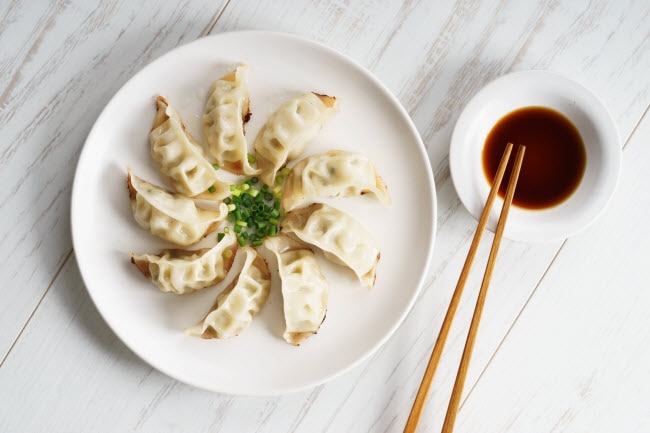Have you had Chinese food?
Sure, you’ve had your fair share of the fast-food takeaway. After all, there are nearly 41,000 Chinese restaurants spread across the land, nestled in strip malls or occupying prime real estate along crowded boulevards. In fact, The Fortune Cookie Chronicles noted there are more Chinese restaurants in the country than McDonalds, Burger King and Kentucky Fried Chicken combined!
So here’s a better question: have you had authentic Chinese cuisine?
Authentic = Healthy Chinese Food
When it comes to healthy Chinese food, authentic recipes are your best option. Unfortunately, many of the tried-and-true takeout dishes don’t have roots in China.
Chop suey, for example, was invented in the 19th century by San Francisco chefs who threw a bunch of ingredients in a pan and unintentionally started a craze. What about those beloved fortune cookies? They hail from Japanese tradition. And most Chinese people have never even heard of General Tsao. The saucy fried-chicken dish that Americans know as General Tsao’s is a completely foreign recipe to traditional Chinese chefs.
As you can tell, Americanized Chinese food tends to be sweet and fried to a crisp. Authentic Chinese food, on the other hand, is often steamed or roasted. And instead of cream cheese or fake crab meat, real Chinese food features broth, hoisin sauce, lean proteins and powerful spices.
Not only is authentic, homemade Chinese food a healthier choice, travel experts from China Highlights point out that it’s also:
- Fast — Much of Chinese cooking is done at high heat in a wok, and many dishes can be prepared in advanced.
- Cost effective— Picking fresh, local produce saves you time and money.
- Versatile — While Chinese cuisine may feature several ingredients in one recipe, pantry essentials – like minced garlic and sesame oil – can be used in a variety of recipes.
- Sociable — Authentic Chinese recipes are perfect for feeding crowds, because they tend to make large portions and can mostly be made ahead of time.
6 Healthy Chinese Food Options + Dessert
According to some of the most well-versed chefs of Chinese cuisine, there are several authentic dishes that are truly wholesome. Your healthy Chinese food options include, but are certainly not limited to:
- Peking duck (a simple roasted duck dish)
- Shredded pork in garlic sauce
- Chicken and peppers stir-fry
- Vegetable stir-fry
- Ginger-bok choy stir-fry
- Cucumber salad
When it comes to Chinese dessert, the most authentic sweet needs no doctoring at all, because it’s an orange! Oranges are considered fortuitous in Chinese culture, which is why most Chinese households end their meals with a slice of orange—not fortune cookies.
How to Prepare Paleo-Approved Chinese Food
Select seasonal produce. Choose local and organic produce whenever possible. Many common vegetables in Chinese cuisine are available year-round but have specific peak seasons. Broccolini, for instance, peaks October through April. Carrots are best in fall and late spring, while peppers are prime July through September. If you’re looking for Chinese cabbages, such as bok choy, wait for winter.
Choose mindfully sourced protein. Whether your paleo plate consists of pork, chicken or beef, be sure it’s pasture-fed or grass-fed. This will limit your exposure to unnecessary hormones and antibiotics that are added to bulk up the protein. Healthy Chinese food consists of ingredients that are as close to their natural state as possible.
Go heavy on herbs and spices. Chinese cuisine is rich with garlic, ginger, chili powder and fennel. Use these pungent seasonings to fire up your taste buds, and you won’t miss any added sodium or sugary sauces.
Swap sauces. Speaking of sauces, there are plenty of healthy swaps you can make to keep the authentic Chinese flavor. For stir-frys, consider replacing vegetable oil with coconut oil. If making chicken chow mein, choose coconut aminos in lieu of high-sodium soy sauce.
Veg on veggies. Whether you’re enjoying paleo-friendly Chinese food or healthy Indian food, more veggies are always a smart idea. Even an egg drop soup recipe can include a variety of your favorite greens. Remember, MyPlate recommends that half of your plate should consist of vegetables at any given meal.
So, is Chinese food bad for you? It certainly can be if you consistently order from a Chinese takeout menu. But when you choose real, homemade Chinese cuisine (or prepare it yourself!), you’ll have no problem sticking to your healthy eating habits.
Sources:
- Lee, Jennifer 8. The Fortune Cookie Chronicles: Adventures in the World of Chinese Food. Twelve, 2009.
- https://firstwefeast.com/eat/2016/07/american-chinese-restaurants-truths-revealed/revised-dishes
- https://www.businessinsider.com/authentic-chinese-food-vs-american-chinese-food-2014-7
- https://www.huffingtonpost.com/topic/sugar-addiction
- https://www.chinahighlights.com/travelguide/article-healthy-chinese-cooking.htm




